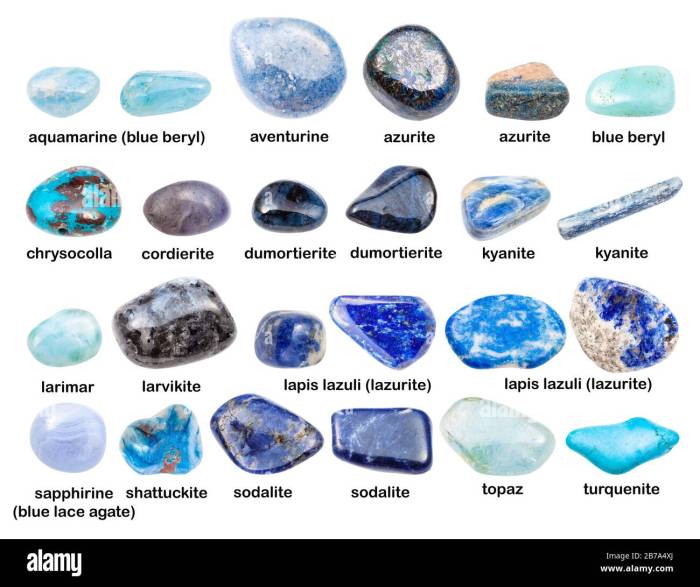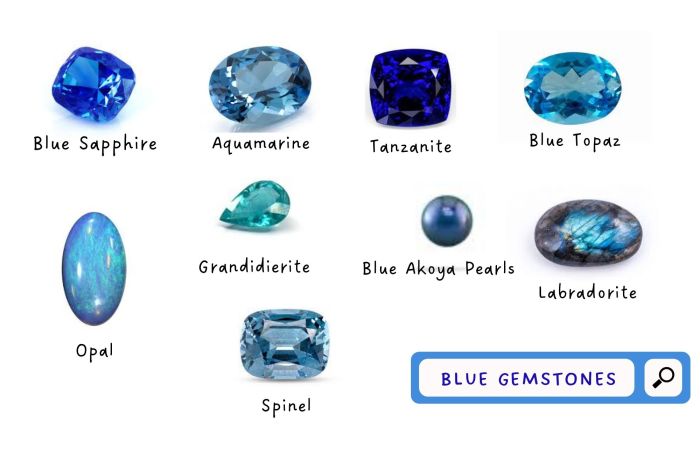Blue stones and crystals have captivated human imagination for centuries, adorning jewelry, inspiring art, and holding profound significance in spiritual and metaphysical practices. From their captivating hues to their enigmatic energies, these precious gems invite us on a journey of discovery and enchantment.
Their captivating blue hues, influenced by unique chemical and physical properties, range from the ethereal azure of aquamarine to the deep indigo of lapis lazuli. These stones embody a rich tapestry of minerals and gemstones, each with its own distinct characteristics and lore.
Blue Stones: Properties and Characteristics: Blue Stones And Crystals
Blue stones are captivating gemstones and minerals renowned for their enchanting azure hues. Their unique physical and chemical properties contribute to their distinctive appearance and allure.
The coloration of blue stones primarily arises from the presence of certain transition metal ions, such as copper, iron, and titanium. These ions absorb specific wavelengths of light, resulting in the reflection of blue light that we perceive as the stone’s color.
Examples of Blue Stones

- Lapis lazuli
- Sapphire
- Turquoise
- Aquamarine
- Topaz
The intensity and shade of blue can vary significantly among these stones, influenced by factors such as the concentration of metal ions, crystal structure, and the presence of impurities.
Crystals and Blue Stones
In spiritual and metaphysical practices, crystals are believed to possess energetic properties that can interact with the human body and mind. Blue crystals, in particular, are often associated with specific chakras or energy centers.
For instance, lapis lazuli is believed to resonate with the third eye chakra, promoting intuition and spiritual awareness. Aquamarine is linked to the throat chakra, facilitating communication and self-expression.
Healing Properties

Blue crystals are also attributed with various healing properties. Lapis lazuli is said to aid in reducing stress and anxiety, while turquoise is believed to promote physical healing and detoxification.
Historical and Cultural Significance
Blue stones have been treasured throughout history for their beauty and symbolic meaning. Ancient civilizations, such as the Egyptians, Romans, and Chinese, incorporated blue stones into jewelry, art, and architecture.
In ancient Egypt, lapis lazuli was highly valued as a symbol of royalty and divinity. The iconic blue scarab beetles, often made from lapis lazuli, represented rebirth and transformation.
In Chinese culture, turquoise was believed to possess protective powers and was often used in amulets and talismans. It was also associated with good luck and prosperity.
Identification and Authentication
Identifying and distinguishing genuine blue stones from imitations is crucial to ensure authenticity and value. Several methods can be employed for this purpose.
Visual examination can reveal certain characteristics, such as color, clarity, and inclusions, that can help identify the stone. Gemological testing, such as refractive index and specific gravity measurements, can further assist in determining the stone’s composition.
Certification
Reputable gemological laboratories provide certification services that verify the authenticity and quality of blue stones. These certificates provide assurance to buyers and collectors.
Care and Maintenance

Proper care and maintenance are essential to preserve the beauty and longevity of blue stones. Regular cleaning with a soft cloth and mild detergent can remove dirt and grime.
Blue stones should be stored in a cool, dry place away from direct sunlight. Harsh chemicals and ultrasonic cleaners should be avoided, as they can damage the stone’s surface.
Repairs and Restoration
In case of damage, such as chips or cracks, it is advisable to seek professional repair services from a qualified jeweler or gemologist.
Applications and Uses
Blue stones find diverse applications in various fields.
Jewelry, Blue stones and crystals
Blue stones are highly sought after in jewelry, where they are crafted into necklaces, earrings, bracelets, and rings. Their captivating colors and unique properties make them popular choices for both everyday wear and special occasions.
Home Décor
Blue stones are also used in home décor, adding a touch of elegance and sophistication. They can be incorporated into decorative objects, such as vases, sculptures, and lamps.
Art and Architecture
Blue stones have been used in art and architecture throughout history. In ancient Egypt, lapis lazuli was used to create stunning mosaics and wall paintings. In modern times, blue stones are often used in sculptures, stained glass windows, and other artistic creations.
FAQ Corner
What factors contribute to the blue coloration of stones?
The presence of certain elements, such as copper, iron, and titanium, can impart blue hues to stones.
What is the significance of blue crystals in spiritual practices?
Blue crystals are often associated with the throat chakra, promoting communication, self-expression, and inner peace.
How can I identify genuine blue stones from imitations?
Seek certification or gemological testing to verify authenticity and detect any treatments or enhancements.
What are the proper cleaning methods for blue stones?
Use mild soap and water, avoid harsh chemicals, and clean regularly to maintain their luster.
